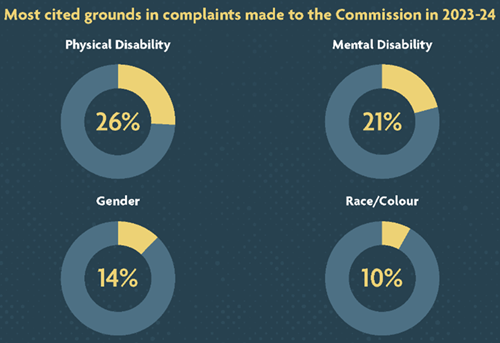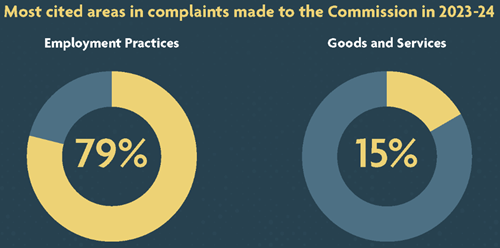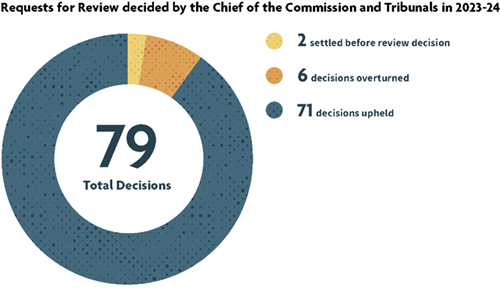The Commission's current 2023-24 Annual Report provides information on how many complaints were opened and closed and at what stage of the process they were closed. It also has information about the Commission's extensive education program.
Annual report
Human rights complaints
Individuals who believe they have experienced discrimination, as defined by the Alberta Human Rights Act, may make a complaint to the Alberta Human Rights Commission. The Commission can only accept complaints that are within its jurisdiction. The Commission provides services to resolve and settle complaints, while the Tribunal adjudicates complaints that cannot be resolved.
In the 2023-24 fiscal year:
- the Commission opened 1,047 complaint files
- the Commission closed 821 complaint files
- 83% of the complaints closed were dealt with through the Commission's complaint resolution and settlement processes
- the remaining 17% closed through the tribunal process
2023-24 complaint statistics
Files opened and closed
Aa part of the Commission's 50th anniversary year, we introduced significant changes to improve access to information and help Albertans better access the complaint process, including launching an online complaint form.
| Complaints opened and closed and year-end count | |||
|---|---|---|---|
| 2021-22 | 2022-23 | 2023-24 | |
| Complaints opened | 1,040 | 822 | 1,047 |
| Complaints closed | 1,118 | 988 | 821 |
| Open complaints at March 31 | 1,589 | 1,423 | 1,649 |
Note: Commission staff review completed human rights complaint forms to determine if they can be accepted as complaints under the Act. Complaints must fall within jurisdiction of the Act, demonstrate reasonable grounds, be made within one year of the alleged contravention of the Act, and meet requirements described in the Commission's Bylaws.
The Commission's new complaint process, implemented in 2022, continued to benefit Albertans in 2023-24. Changes to the process included using specialized teams, triaging complaints, placing more emphasis on conciliation, and having a team that drafts decisions for the Director's review.
- These changes proved impactful this year, given the record number of potential complaints received (2,255) and accepted complaints (1,047).
- We have seen a significant reduction in the average length of time from acceptance of a complaint until resolution, dismissal, or referral to Tribunal. In 2023-24, the average length of time a file spent in the Director's stage was 555 days, compared to 844 days in 2020-21.
Grounds cited
As in previous years, discrimination on the grounds of physical disability and mental disability were the most commonly cited in complaints opened in 2023-24.

This table provides information on the number of grounds and areas cited in the 1,047 new complaint files opened in 2023-24. Each complaint may cite more than one ground and area. Percentages have been rounded.
| Complaints by ground and independent areas* | |||
|---|---|---|---|
| April 1, 2023 - March 31, 2024 | |||
| Protected ground | Times cited | Per cent of total | |
| Physical disability | 881 | 26% | |
| Mental disability | 712 | 21% | |
| Gender | 468 | 14% | |
| Race/Colour | 320 | 10% | |
| Ancestry/Origin | 251 | 8% | |
| Family status | 195 | 6% | |
| Age | 160 | 5% | |
| Religious beliefs | 92 | 3% | |
| Sexual orientation | 60 | 2% | |
| Marital status | 54 | 2% | |
| Gender expression | 43 | 1% | |
| Gender identity | 39 | 1% | |
| Retaliation* | 34 | 1% | |
| Source of Income | 19 | <1% | |
| Equal pay* | 13 | <1% | |
| Malicious intent* | 0 | 0% | |
| Total | 3,341 | ||
* Sections 6 and 10 of the Act allow for complaints that do not depend on the involvement of a protected ground. These sections are referred to as independent areas.
Sections cited
As in previous years, discrimination in the area of employment was the most commonly cited section in complaints opened in 2023-24.

This table provides information on the number of areas cited in the 1,047 new complaint files opened in 2023-24. Each complaint may cite more than one protected ground and area.
| Complaint grounds cited by section of the Alberta Human Rights Act | |
|---|---|
| April 1, 2023 - March 31, 2024 | |
| Protected area | Per cent of total |
| Employment practices (section 7) | 79% |
| Good, services, accommodation, or facilities (section 4) | 15% |
| Tenancy (section 5) | 3% |
| Retaliation (section 10.1) | 1% |
| Applications and advertisements re: employment (section 8) | 1% |
| Publications, notices (section 3) | <1% |
| Equal pay* (section 6) | <1% |
| Membership in trade unions, etc. (section 9) | <1% |
| Frivolous or vexatious complaints with malicious intent* (section 10.2) | 0% |
* Sections 6 and 10 of the Act allow for complaints that do not depend on the involvement of a protected ground. These sections are referred to as independent areas.
Appeal and tribunal process
Requests for Review decided by the Chief of the Commission and Tribunals in 2023-24
If the Director of the Commission dismisses a complaint, the complainant may file a Request for Review to the Chief, pursuant to section 26 of the Alberta Human Rights Act.
In 2023-24, 79 Requests for Reviews were decided. For 71 complaints, the Chief agreed (or upheld) with the Director's dismissal and the files were closed. For six complaints, the Chief disagreed (or overturned) with the dismissal and the complaints proceeded to Tribunal. The remaining two complaints settled before a review decision was made.

Tribunal Process
At the Tribunal process, parties are offered mediation by a Member of the Commission through a tribunal dispute resolution (TDR) process. If the parties are unable to settle the matter at TDR or choose not to participate in the TDR, the matter proceeds to a tribunal hearing for adjudication by a different Member or Members.
The Tribunal continues to prioritize timely scheduling of TDRs to ensure efficiency in its process. In 2023-24, they held 89 TDR sessions. Sessions were held within an average of 107 days from when the Tribunal received the complaint, representing a 28-day reduction in wait times compared to the previous year.
These are the outcomes of the 138 complaints closed through the human rights Tribunal process:
- 69 closed through the TDR process
- 35 closed through private settlement
- 25 closed as a result of a tribunal hearing
- 9 withdrawn or closed for other reasons
Public education, outreach, and engagement
The Commission informs and educates the public on human rights principles, their rights and responsibilities under Alberta's human rights legislation, and the Commission's programs and services.
In the 2023-24 fiscal year, the Commission:
- Informed Albertans by launching a new website in September 2023. This core education tool combines best practices in accessibility with an updated design to improve the user experience and help Albertans better navigate our information. Supported by extensive research and feedback from diverse communities in Alberta, the website includes new content written in plain language that speaks to Albertans' questions about human rights in an approachable and clear way.
- Celebrated our 50th anniversary by:
- continuing to roll out the #AB50for50 campaign. The initiative encouraged Albertans to spend a minimum of 50 minutes in 2023 expanding their knowledge and understanding of human rights.
- bringing together more than 250 human rights stakeholders for a learning event to highlight current human rights issues and look towards the future of human rights in Alberta.
- Delivered six online public workshops at full registration capacity
- Launched a Facebook account, reaching nearly 2,000 people in its first four months
- Educated the public through webinars and videos with 7,719 views
- Informed 3,298 people subscribed to our online newsletter, Alberta Human Rights Information Service, about recent Tribunal decisions, Commission news and events, significant human rights dates, and related human rights information
- Spoke at 46 events, including conferences, annual general meetings, seminars, learning sessions, community gatherings, and much more, on various topics related to human rights
- Responded to 15 media requests on various topics
- Released six public statements on important issues and dates significant to human rights and diversity
- Continued its commitment to building respectful and trusting relationships with Indigenous people and organizations in Alberta. With support from the Indigenous Advisory Circle, we deepened our knowledge of Indigenous histories and the current legacies of colonialism and participated in specialized training on how to use our blessed eagle feathers.
- Collaborated with partner organizations on several initiatives addressing hate, racism, and inequity, including the Coalitions Creating Equity (CCE) initiative, Stop Hate AB, and PolicyWise
- Collaborated with key stakeholders in the disability sector working on accessibility legislation in Alberta
- Provided specialized consultative and advisory services to assist organizations, institutions, and governments to advance their human rights programs and initiatives within Alberta and internationally
